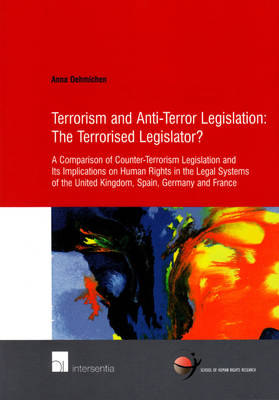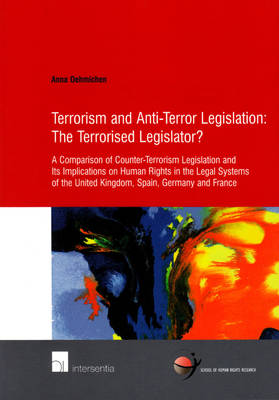
- Afhalen na 1 uur in een winkel met voorraad
- Gratis thuislevering in België vanaf € 30
- Ruim aanbod met 7 miljoen producten
- Afhalen na 1 uur in een winkel met voorraad
- Gratis thuislevering in België vanaf € 30
- Ruim aanbod met 7 miljoen producten
Terrorism and Anti-Terror Legislation: The Terrorised Legislator?
A Comparison of Counter-Terrorism Legislation and Its Implications on Human Rights in the Legal Systems of the United Kingdom, Spain, Germany and France Volume 34
Anna OehmichenOmschrijving
The present volume deals with terrorism, both the legislative reactions to it and its impact on human rights. It is argued that the preservation of human rights is vital for the prevention of terrorism, encompassing state and non-state terrorism alike. Further, the study shows that legislators tend to disregard fundamental human rights when confronted with terrorism. They are "terrorised" themselves by the incident and risk to overreact.
After an historical account of selected (pseudo-?)terrorist movements throughout time and space, an inventory of anti-terror legislation in four European countries within the last forty years follows. In this context, the author examines the role of the judiciary with a special focus on the European Court of Human Rights in Strasbourg. As a result, we get a complex view on what happened with regard to terrorism and anti-terrorism in different European countries in the past and is happening at present, and what this means for human rights. This allows us to put contemporary anti-terror legislation into perspective. How have different governments dealt with terrorism in the past? How has the law developed after September 11th 2001? Which lessons can be learned, and what can we expect in the future?
About this book
'This book is to be recommended since it discusses both the European choices in the fight against terror and their problems.'
Sarah Baier in Newsletter Menschenrechte 2010 (1).
Specificaties
Betrokkenen
- Auteur(s):
- Uitgeverij:
Inhoud
- Aantal bladzijden:
- 444
- Taal:
- Engels
- Reeks:
Eigenschappen
- Productcode (EAN):
- 9789050959568
- Verschijningsdatum:
- 25/09/2009
- Uitvoering:
- Paperback
- Formaat:
- Trade paperback (VS)
- Afmetingen:
- 165 mm x 235 mm
- Gewicht:
- 798 g

Alleen bij Standaard Boekhandel
Beoordelingen
We publiceren alleen reviews die voldoen aan de voorwaarden voor reviews. Bekijk onze voorwaarden voor reviews.











